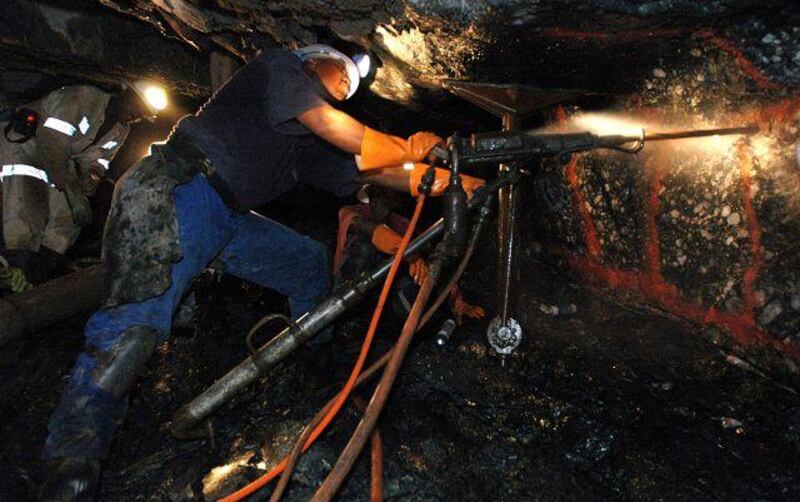JOHANNESBURG // Global gold production will decline in the next five to 10 years as the cost of mining more remote and lower quality reserves outpaces the metal's price, the head of the world's third-largest gold mining company said. Mark Cutifani, the chief executive of AngloGold Ashanti, which mines on four continents, said world gold production had been declining for seven years and would continue on this path as mining became increasingly labour-intensive.
"It's a lot harder to find, a lot tougher and a lot more expensive, and the price of gold hasn't supported the exploration necessary to replenish reserves, so I think we're on a downwards spiral in terms of production over the next five to 10 years," he said. "As a company, we're out to try to turn that trend around, but we're challenged like everyone else." The UAE is one of the world's largest gold consumers, with demand last year running to almost 110 tonnes, according to the World Gold Council. Most of the country's demand is for jewellery and investment purposes, and the metal is still used widely in the region as a store of value.
In South Africa, where the company does 40 per cent of its business, there has been a 20 to 30 per cent decline in production over the past five years, as the grades of opencast mines around the world continue to decline. "In our case in South Africa, we have made no new discovery for 20 years," said Mr Cutifani. "In the areas that we are mining, we started off near the surface and we are now working on how to mine safely at 5km. That's much tougher, and your ability to produce an ounce of gold there, versus on the surface, is probably a factor of 21 [more difficult] in terms of the technical challenges."
In recent years, the company has been pursuing projects in Colombia, China, Brazil, the US and Australia, as well as other African countries such as Ghana, Guinea, Tanzania and Namibia. This month, AngloGold Ashanti signed a joint venture with Thani Dubai Mining, a subsidiary of Dubai-based Thani Investments, to explore the mining of gold and other precious and base metals in the Middle East and North Africa.
The slower production meant that gold would remain a solid investment vehicle for the foreseeable future, Mr Cutifani said. He sees gold's price having room to grow above its current price. "From an investment perspective, it could trade anywhere from $950 to $1,200 in the next few years," he said. "There are still a lot of hedge funds with gold positions, and they will liquidate those positions when they think we've got to the top. If it gets to $1,200, then I think you'll see some liquidation."
Mr Cutifani expects gold to remain a popular investment vehicle as the global economic crisis wears on. "I don't know how deep the economic crisis will be, but I don't think we're coming out of it," he said. "We're bouncing along the bottom. It's U-shaped, and none of us is sure how long the 'U' will be. That's a personal view, and it's coming from the industrial sector." In recent years gold miners have begun winding down their hedge books - gold they promise to sell in the future at a fixed price. Hedging was a preferred method of protecting cash flow during the years of a declining gold price, as it gave producers a guaranteed income. Last year, Mr Cutifani said AngloGold Ashanti intended to reduce its hedge book by 45 per cent by the end of 2008. The book would be totally eliminated within eight years, he said.
On Monday, spot gold was trading at about $940 an ounce on the New York Mercantile Exchange's Comex division, after touching $949 last week, the highest since June 12, Bloomberg reported. The 0.5 per cent weekly gain was the first since May 29, and the four-day rally was the longest in five weeks. khagey@thenational.ae * additional reporting by Gavin du Venage





